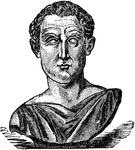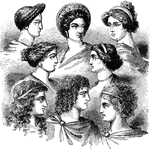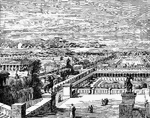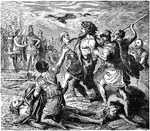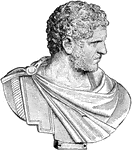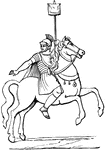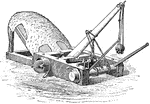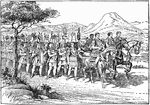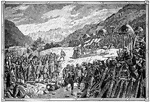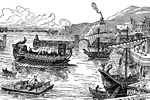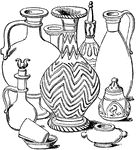
High Priest of Israel
Also known as Kohen Gadol or Kohen ha-Gadol. The High Priest of Israel could officiate sacrifices and…

Ancient Susa
An image depicting an ancient city of the Persian, Parthian, and Elamite empires of Iran.
!["Here [Darius] was assassinated by Bessus, the satrap of Bactria. He was discovered by Alexander in a dying condition by the roadside. He asked for a cup of water, thanked the giver, and died. And with him died the Empire of the Persians."—Ridpath, 1885](https://etc.usf.edu/clipart/78900/78909/78909_dariusbody_mth.gif)
Alexander Discovers the Body of Darius
"Here [Darius] was assassinated by Bessus, the satrap of Bactria. He was discovered by Alexander in…
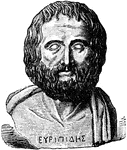
Euripides
"The next evolution is presented in Euripides. He is less ideal than his predeccesor, but truer to nature.…

Theater of Segesta
One of the first Greek amphitheaters, located in the political center of the Elymian people.

Aristophanes
A stature of Aristophanes, who was a prolific and commonly celebrated playwright of comedy. He is also…
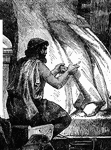
Phidias in His Study
"Phidias was the chief glory of the administration of Pericles. To him was committed the work of making…
!["Afterwards [Solon] went to Sardis and made the acquaintance of Cresus. It was on this occasion that the celebrated interview occurred which has been so much repeated for its lesson. Cresus, desiring to make an impression on his visitor, took him into his treasury and showed him his riches."—Ridpath, 1885](https://etc.usf.edu/clipart/78900/78916/78916_treasures_mth.gif)
Cresus Showing Solon His Treasures
"Afterwards [Solon] went to Sardis and made the acquaintance of Cresus. It was on this occasion that…
!["The first noted public appearance of [Alcibiades] was on the occasion of the coming of the Lacedaemonian ambassadors requesting the surrender of Pylus. He at first violently opposed the petition, and even went so far as to urge the sending of an embassy to Argos to solicit that city to become a member in a new Athenian league. In spite of the earnest efforts of Nicias and of the protests of the Spartan ambassador, Alcibiades, by means of intrigue and bluster, succeeded in this work, and not only Argos, but also Elis and Mantinea, agreed to maintain an alliance with Athens for a hundred years."—Ridpath, 1885](https://etc.usf.edu/clipart/78900/78918/78918_alcibiades_mth.gif)
Alcibiades
"The first noted public appearance of [Alcibiades] was on the occasion of the coming of the Lacedaemonian…
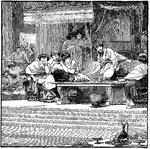
Banquet of Damocles
Image depicting a mythical moral anecdote, consisting of two morals. The first that regardless of who…
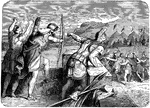
Astor to Philip's Right Eye
"It was during the siege of Methone that Philip had the misfortune to lose on of his eyes. A random…

The Isthmian Games
One of the Panhellenic Games of Ancient Greece. They were held both the year before and the year after…

Colossus at Rhodes
Statue of the Greek god Helios. It is currently considered to be one of the Seven Wonders of the Ancient…

Circus Maximus
"Chariot-racing was a favorite amusement, and the great circuses were arranged especially for such contests.…
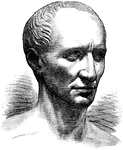
Julius Caesar
An image depicting Julius Caesar, a Roman general and statesman. He was a key component to the shift…
!["After a successful summer campaign, [Caesar] made his way to the coast and cross over into Britain. He then withdrew into his winter-quarters in Gaul, but in the following year returned into the island, defeated the British Celts under their king Cassivellaunus, and reduced the country to a dependency, compelling the Britons to pay tribute and give hostages."](https://etc.usf.edu/clipart/78900/78943/78943_landing_01_mth.gif)
Landing of the Romans in Britain
"After a successful summer campaign, [Caesar] made his way to the coast and cross over into Britain.…
Caesar Crossing the Rubicon
An image of Julius Caesar and his army crossing the Rubicon River, which is located in northeastern…
!["[Caesar] mustered the soldiers in the Campius Martius, and requested a statement of their grievances. Their demands appeared to have a reference to a payment of their dues, the bestowal of promised presents, and a release from further duty. Caesar well knew that the best way to humiliate an insurrection is to grant what it clamors for. He accordingly made an address to his old legion, being careful to begin with "Citizens," instead of "Soldiers." This was gall and wormwood. To be addressed as citizens by their beloved commander! "I discharge you." said he. "You have had enough of fatigue and wounds. I release you from your oath. As to your presents, you shall be paid to the last sesterce." The old veterans could stand no more. They burst into tears, and began to beg for forgiveness. With a certain prudent hesitation, Caesar received them back to favor; but he took care that the leaders who had fomented the mutiny should be executed."—Ridpath, 1885](https://etc.usf.edu/clipart/78900/78945/78945_citizens_01_mth.gif)
Citizens! I Discharge You.
"[Caesar] mustered the soldiers in the Campius Martius, and requested a statement of their grievances.…
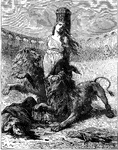
Christians Given to the Lions in the Roman Amphitheater
"More particularly was the new sect of Christians selected as the objects of vengeance. These people…
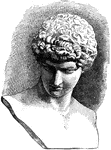
Antinous
"It was during Hadrian's sojourn in this country that his favorite, the beautiful Birthynian named Antinous,…
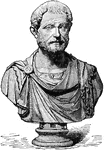
Probus
"The next Emperor was Aurelius Probus, officer of the army of Germany. He was chosen by the legions,…
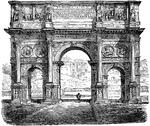
Arch of Constantine
The Arch of Constantine was erected to celebrate Constantine's victory of Maxentius at the Battle of…
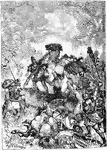
Death of Julian the Apostate
A depiction of Julian the Apostate, a noted philosopher and Roman Emperor, and his death.
!["In order that [Alaric's] body might be saved from the gaze of the vulgar and the rage of his foes, he gave direction that it should be buried in the bed of the river Busentinus."—Ridpath, 1885](https://etc.usf.edu/clipart/78900/78952/78952_alaricburial_mth.gif)
The Burial of Alaric in the Bed of the Busentinus
"In order that [Alaric's] body might be saved from the gaze of the vulgar and the rage of his foes,…
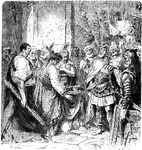
Odoacer Compels Augustulus to Yield the Crown
Augustulus is deposed from the crown by Odoacer, and was thus the last Western Roman Emperor.
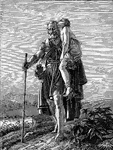
Blind Belsarius
Belsarius was ordered to have his eyes put out, and was reduced to a homeless beggar.

Roman Boy
"The two chief avenues that were open to advancement were the political and the military. He must be…

Consul and Lictors
The consul was the highest elected office of the Roman Republic. They were elected every year. The lictors…

Gallic Remains
"1 and 3, necklaces with amber and coral pendants; 2, military standard; 4, bronze trumpet; 5, iron…

Tormenta Within a Fortified Camp
"The romans had no knowledge of gunpowder, siege cannon, or field guns; but the place of modern artillery…
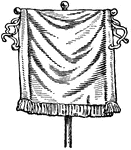
Vexillum
A flag-like object. The cloth was draped from a horizontal cross suspended from the staff. It was a…
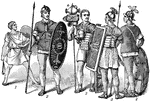
Roman Soldiers and Equipment
"1, funditor; 2, 2, milites levis armaturae; 3, 3, legionarii; 4, sarcina."—D'ooge & Eastman,…

Castra Romana
"A, via principalis. B, via documana. C, porta praetoria. D, porta decumana. E, portq principalis dextra.…
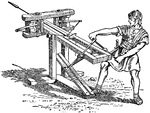
A Catapult
A catapult as used during the Roman Empire. The catapult is an effective device used to hurl an object…

Eagle Bearer
An eagle bearer from the Roman Empire. The eagle was made of precious metal and was the symbol of the…
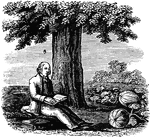
Man Thinks Himself Wise, till God Shows Him His Folly
"A philosopher, seating himself under an oak tree, and viewing its massiveness, could not understand…
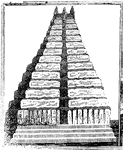
Ancient Pyramid
"The pyramids of Egypt are well entitled to a place among the most interesting curiosities in the world.…
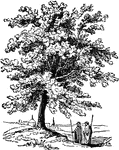
Terebinth Tree
A small deciduous tree, native to the Mediterranean region. It produced the earliest-known form of turpentine,…
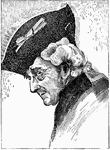
Frederick the Great
Also known as Frederick II of Prussia. He reigned from 1740 to 1786 and was a proponent of enlightened…
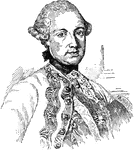
Joseph II
The Holy Roman Emperor from 1765 to 1790, and ruler of the Habsburg lands from 1780 to 1790.

Emmanuel Joseph Sieyès
A French Roman Catholic clergyman who helped transform the Estates-General into the National Assembly.

La Madeleine
"Begun by Napoleon in 1806; not completed until 1842. The emperor planned it as a 'of fame' to commemorate…
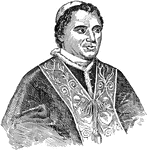
Pope Pius IX
The second longest-reigning elected Pope in Church history, serving from 1846 until his death in 1878.…

Væ Victis!
William I, in the garb of an ancient Germanic chieftain, rides his charger over the body of prostate…

Chamber of Deputies (Paris)
"This fine structure was built in the eighteenth century as a palace for members of the Bourbon-Condé…
